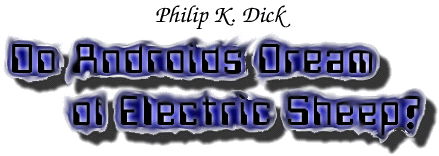


Do Androids Dream of Electric Sheep? (1968) is probably Philip K. Dick's most well-known novel. This is due, in part, to its subsequent adaptation by Ridley Scott into the movie Blade Runner. This novel is without a doubt Dick's most important android work, and arguably one of the most important novels about androids or artificial humans. It looks at what it means to be human, questions reality, and blurs the lines between real and artificial. In this novel the humans become inhuman and the androids become human. The humans question their own humanity and the androids question their artificiality. This book fully explores the robot consciousness its implications. Would robots want their freedom if they became just like humans? Should they have their own rights? Are androids capable of empathy?
Plot Summary:
Rick Deckard, a bounty hunter, plans to kill enough errant
androids (replicants) so he can replace his robotic sheep with a real
one. In the process of hunting down these slave pseudo-humans, Rick
Deckard falls in love with an android and learns about himself and
what it means to be human--and inhuman.
What is the role of the robot? Why was it
created?:
The androids in Do Androids Dream of Electric
Sheep? are created to be the slaves of humans. They are
specifically designed as laborers on Lunar colonies: many humans have
left Earth because it has become polluted and unfit for life.
Is the robot designed to look human?:
The replicants in this book are created to exactly
resemble humans. There is often confusion whether a humanoid is real
or android. Bounty hunters and others use the Voigt-Kampff test to
distinguish human from replicant. The test consists of questions
which elicit an emotional response. Replicants supposedly have no
capacity for empathy, and their unemotional reaction to Voigt-Kampff
questions reveals their artificiality.
What is the reaction to the robot? How is it
viewed?:
Humans rely on the replicants for their labor, but when
they escape the colonies and integrate with "real" humans they become
the enemies--something to be "retired."
What are the consequences of the robot?:
Replicants are the way Rick Deckard explores his own
humanity in this novel. They make Deckard realize that he might not
be so human after all. Rick Deckard actually becomes more inhuman
than the replicants he is remorselessly hunting. Deckard also falls
in love with the replicant Rachel in this story.
Conclusion:
This novel is the blending of the human and the
artificial. It explores human consciousness, robot consciousness, and
how they are similar and different. It is one of the fundamental
books about the consequences of sentient robots that look identical
to humans. Who or what is the real human? This is the main theme of
this novel.